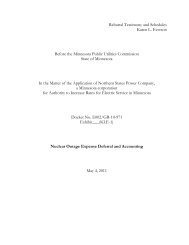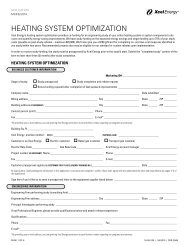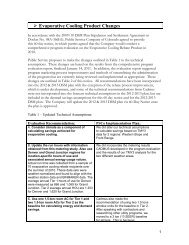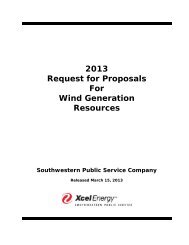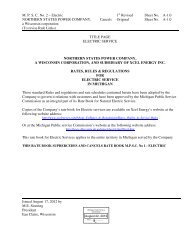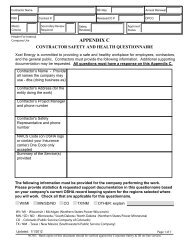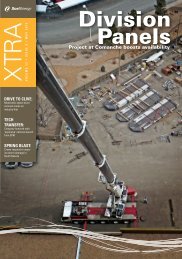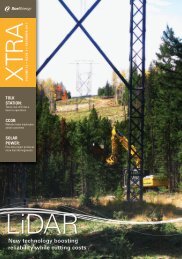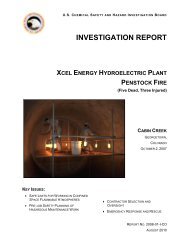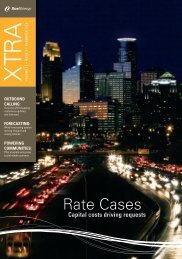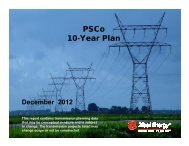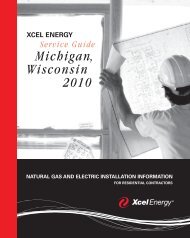Biomass Feasibility Project Final Report - Xcel Energy
Biomass Feasibility Project Final Report - Xcel Energy
Biomass Feasibility Project Final Report - Xcel Energy
You also want an ePaper? Increase the reach of your titles
YUMPU automatically turns print PDFs into web optimized ePapers that Google loves.
The businesses compensate the cities by paying taxes they normally would have to pay<br />
regardless.<br />
TIF and JOBZ therefore are mutually exclusive. Companies in JOBZ zones do not pay property<br />
taxes that would be captured to pay TIF bonds.<br />
Although TIF is subject to state statute, the project’s home city administers it. The person with<br />
whom to begin a discussion of TIF is the city administrator in the municipality where the project<br />
will be located. A good introduction to the complicated TIF process is online at:<br />
www.fryberger.com/Admin_Gov.<br />
Economic Development Tax Abatement<br />
Minnesota Statutes Sections 469.1812 to 469.1815 created an alternative to TIF. A political<br />
subdivision may “abate” all or a portion of its property tax on one or more parcels of real or<br />
personal property, including machinery, for economic development purposes, subject to a<br />
duration limit and a limit on the amount of abatements. The “abatement” can take a number<br />
of different forms, including:<br />
• A rebate of property taxes to the property owner;<br />
• A reallocation of taxes to pay bondholders;<br />
• A reallocation of taxes to pay for public infrastructure costs; OR<br />
• A deferment of property taxes.<br />
Revision Date: August 23, 2006<br />
Minnesota Small Business Development Loan Program (SMDP)<br />
The Small Business Development Loan Program, administered by the Minnesota Department of<br />
Employment and Economic Development under the federal Revenue Expenditure and Control<br />
Act of 1968, makes fixed-asset, first-lien, fixed-rate loans to aid job growths and manufacturing<br />
expansions. The Minnesota Agricultural and Economic Development Board (MAEDB) funds the<br />
loans by issuing tax-exempt Industrial Development Bonds (IDBs), backed by a state reserve<br />
fund, at the prevailing tax-exempt market rate at the time of issue.<br />
The federal statute authorizing the program limits IDB eligibility to manufacturing industries, but<br />
co-generation projects by manufacturing companies may be eligible, as long as they increase<br />
employment and use some of the electricity in their processes. Bond counsel would determine<br />
eligibility.<br />
Assets financed by IRBs can be real estate, equipment, or a combination of the two. Total<br />
project costs can’t exceed $20 million. Although the program is authorized to lend up to 80% of<br />
project cost, SMBP usually makes loans ranging from $1 million to $5 million with a maximum term<br />
of 20 years. Collateral includes the assets financed and the owners’ personal guarantees.<br />
MAEDB does not charge a fee, but bond issuance costs of 4% are charged against the<br />
advance, and 10% of the bond issue is kept in an escrow account. Funds are disbursed upon<br />
execution of the required loan documents and sale of the bonds. DEED accepts applications<br />
year-round basis, but they must be received by the first of each month to be considered at that<br />
month's MAEDB meeting.<br />
Page 102<br />
Identifying Effective <strong>Biomass</strong> Strategies:<br />
Quantifying Minnesota’s Resources and Evaluating Future Opportunities



